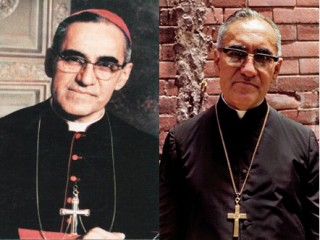
Oscar Romero biography
Date of birth : 1917-08-15
Date of death : 1980-03-24
Birthplace : Ciudad Barrios, El Salvador
Nationality : Salvadorian
Category : Famous Figures
Last modified : 2010-12-20
Credited as : Archbishop of San Salvador, ,
Until his assassination by right-wing gunmen, Archbishop Oscar Romero of San Salvador spoke out courageously in defense of human rights and social justice in strife-torn El Salvador.
Oscar Arnulfo Romero y Galdamez was born in Ciudad Barrios, El Salvador, on August 15, 1917. His father, the town postmaster and telegraph operator, apprenticed him to a carpenter when he was 13, but the younger Romero felt a vocation for the Roman Catholic priesthood and left home the following year to enter the seminary. He studied in El Salvador and in Rome and was ordained in 1942.
Romero spent the first two and half decades of his ministerial career as a parish priest and diocesan secretary in San Miguel. In 1970 he became auxiliary bishop of San Salvador and served in that position until 1974 when the Vatican named him to the see of Santiago de Maria, a poor, rural diocese which included his boyhood hometown. In 1977 he returned to the capital to succeed San Salvador's aged metropolitan archbishop, Luis Chavez y Gonzalez, who had retired after nearly 40 years in office.
Romero's rise to prominence in the Catholic hierarchy coincided with a period of dramatic change in the Church in Latin America. The region's bishops, meeting at Medellin, Colombia, in 1967 to discuss local implementation of the recommendations of the Second Vatican Council (1962-1965), had resolved to abandon the hierarchy's traditional role as defender of the status quo and to side, instead, with the continent's poor in their struggle for social justice. This radical departure divided both the faithful and the clergy. Conservative laymen complained of "Communist" priests, while many clerics refused to accept the new role the Church was creating for itself in Latin American society.
In El Salvador, an extremely conservative society where the privileged few enjoyed great wealth at the expense of the impoverished majority, younger priests, among them many foreigners, grasped the new ideas enthusiastically, but the only prelate who encouraged them was Archbishop Chavez y Gonzalez. During this period Oscar Romero's reputation was as a conservative, and on more than one occasion he showed himself skeptical of both the Vatican II reforms and the Medellin pronouncements. For this reason his appointment as archbishop in 1977 was not popular with the politically active clergy, to whom it appeared to signal the Vatican's desire to restrain them. To their surprise, Romero emerged almost immediately as an outspoken opponent of injustice and defender of the poor.
By Romero's own account, he owed his change of attitude to his brief tenure as bishop of Santiago de MarÃa, where he witnessed firsthand the suffering of El Salvador's landless poor. Increasing government violence against politically active priests and laypersons undermined his trust in the good will of the authorities and led him to fear that the Church and religion themselves were under attack. The assassination on March 12, 1977, of his longtime friend Jesuit Father Rutilio Grande brought a stinging denunciation from Romero, who suspended masses in the nation's churches the following Sunday and demanded the punishment of the responsible parties.
As Romero spoke out more and more frequently over the coming months, he gathered a large popular following who crowded into the cathedral to hear him preach or listened to his sermons over YSAX, the archdiocesan radio station. In his youth Romero had been a pioneer of broadcast evangelism in El Salvador, and he now turned the medium to great effect as he denounced both the violence of El Salvador's developing civil war and the deeply-rooted patterns of abuse and injustice which bred it. In a country whose rulers regarded dissent as subversion, Romero used the moral authority of his position as archbishop to speak out on behalf of those who could not do so for themselves. He soon came to be known as the "Voice of the Voiceless."
When a coup d'etat overthrew the Salvadoran government on October 15, 1979, Romero expressed cautious support for the reformist junta which replaced it. He soon became disenchanted, however, as the persecution of the poor and the Church did not cease. In February 1980 he addressed an open letter to U.S. President Jimmy Carter in which he called upon the United States to discontinue military aid to the regime. "We are fed up with weapons and bullets," he pleaded.
Romero's campaign for human rights in El Salvador won him many national and international admirers as well as a Nobel Peace Prize nomination. It also won him enemies, however. On March 24, 1980, a group of unidentified gunmen entered a small chapel in San Salvador while Romero was celebrating mass and shot him to death. The archbishop had foreseen the danger of assassination and had spoken of it often, declaring his willingness to accept martyrdom if his blood might contribute to the solution of the nation's problems. "As a Christian," he remarked on one such occasion, "I do not believe in death without resurrection. If they kill me, I shall arise in the Salvadoran people."
An excellent account in English of Romero's career is James R. Brockman, S. J., The Word Remains: A Life of Oscar Romero (1982). On the role of the Roman Catholic Church as an advocate of social justice in Latin America, see Penny Lernoux, Cry of the People, 2nd edition (1982).
Brockman, James R., Romero: a life, Maryknoll, N.Y.: Orbis Books, 1989.
















